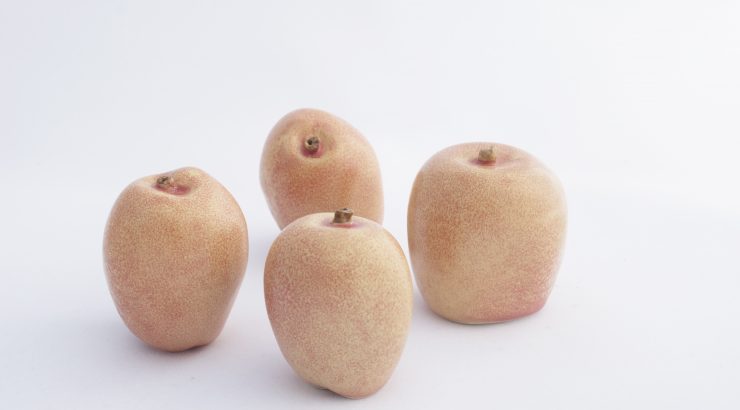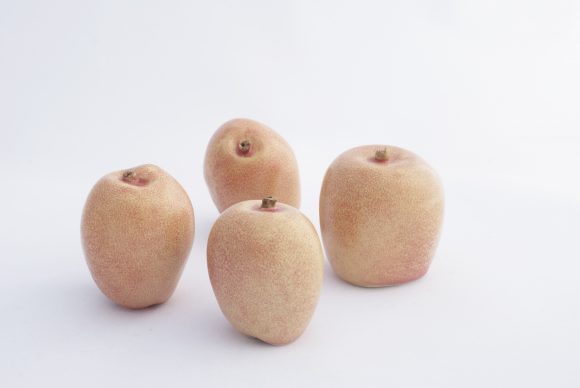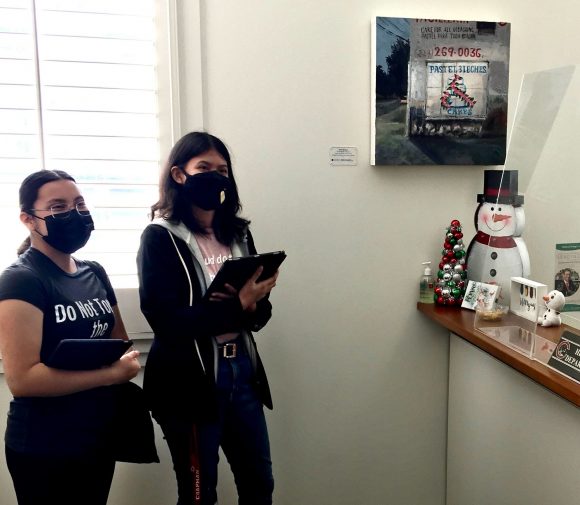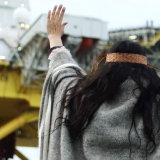
Food for Thought Art Tour Reheating the Leftovers
December 7, 2021
Hungry for art? Recently, the Escalette Collection of Art kicked off the holiday season by hosting the inaugural Food for Thought Art Tour, exploring artwork in the collection that features food. This tour was developed and given by Student Art Ambassadors Ivanna Tijitra (‘25) and Yandel Salas (‘25), who focused on themes of food as a source of community-building and a product of human intervention on the environment. This tour was initially created as part of an assignment for Dr. Fiona Shen’s FFC class: Exploring the Escalette Collection of Art: An Experiential Journey.
Yandel explained that “Having the opportunity to create this tour was both a fun and memorable experience. Looking for the right pieces to include in the tour also led to deeper discovery of the vast range of works that the Escalette Collection offers here at Chapman.”
Food For Thought is part of the Escalette Collection’s new initiative to create shorter, uniquely themed-art tours.
In case you missed it, we’re going to be reheating the leftovers and sharing some of the stops visited.

Jessica Rath, Kazakhstan Elite, high-fire glazed porcelain, 2012. Purchased with funds from the Ellingson Family.
For the first course, we viewed Jessica Rath’s porcelain apple sculptures entitled Kazakhstan Elite, located on the first floor of Smith Hall. Did you know that the apples we eat everyday originate from Kazakhstan? Kazakhstan is home to the only wild apple forest in the world, which holds all of the natural genetic variety for apples. While some of the apples that grow in this forest are tasty, many other species, like the ones recreated by Rath, don’t look like the red juicy fruit we’ve come to expect. But even these apples are important because we need them in order to grow the apples we eat. Apple seeds and saplings have to be grafted from an original source. Food scientists combine the best aspects of several original apple species in order to develop the best tasting, best looking, and most disease-resistant varieties of apples that we see at the grocery store. For this reason, the wild apple forests in Kazakhstan are incredibly important, and yet, they have been subject to a dangerous amount of deforestation over the past 50 years. Rath’s series, which includes sculpture and photography, maps the complicated process of apple growing and raises awareness of the threatened status of the apple forests in Kazakhstan.

Millie Wilson, Untitled (dog and bone), color transparency in aluminum light box, 2011. Purchased with funds from the Escalette Endowment.
Next up on the menu was Millie Wilson’s lightboxes, currently on display in the stairway of Smith Hall. We focused on Untitled (dog and bone), a photograph printed onto a color transparency that depicts a beagle reaching for a pork chop. The warm light emitted from the light box combined with the vintage furniture creates a powerful sense of nostalgia, a feeling that certain foods can also foster. This sense of nostalgia is heightened when one realizes that this photograph wasn’t staged by the artist, but is an “authentic” home photograph. To create these works, Wilson rummages through archives and garage sales to find old photographs depicting the unknown, yet strangely familiar, lives of people’s homes, families, and friends.

Patrick Martinez, boyle heights cake spot, acrylic and stucco on panel, 2016. Purchased with funds from the Escalette Endowment.
For dessert, we stopped at Patrick Martinez’s boyle heights cake spot, an acrylic and stucco painting on display in the History Department in Roosevelt Hall. Everything about this work feels familiar, especially to those who grew up in Southern California. The texture of the building, the painted decoration in the window, and the weathered feeling of the street, all evoke a sense of comfort and home. At the end of this culinary adventure, participants were invited to indulge in a tasty treat, a cookie decorated with Rath’s porcelain apples. Who knew that food and art (and cookies) could co-exist so harmoniously? The idea certainly gave us all some food for thought.
We invite you to explore all the works in the Escalette Collection by visiting our eMuseum.
Wilkinson College of Arts, Humanities, and Social Sciences is the proud home of the Phyllis and Ross Escalette Permanent Collection of Art. The Escalette Collection exists to inspire critical thinking, foster interdisciplinary discovery, and strengthen bonds with the community. Beyond its role in curating art in public spaces, the Escalette is a learning laboratory that offers diverse opportunities for student and engagement and research, and involvement with the wider community. The collection is free and open to the public to view.


